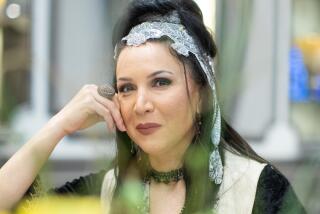Najma Popularizes Sounds of India : The singer has stirred listeners with an updated mixture of Western pop and love poems sung in the Urdu language.
- Share via
When Westerners think of Indian music, it’s usually the ragas they hear as background music at an Indian restaurant. Najma Ahktar, a Muslim born and raised in Britain’s Indian community, is hoping to change that.
“There’s so much more to Indian music than the classical styles people are familiar with,” said the singer, who performs and records under only her first name. “India consists of many dialects and with those dialects come the traditional and folk musics of that region.”
Najma, 25, has already stirred up the world music community with the updated mixture of Indian ghazals (pronounced rozzles) and Western pop on her “Qareeb” album. Released four years ago on Britain’s small Triple Earth label, the record was a striking introduction to Najma’s haunting voice and gracefully melodic music and helped establish her as a major performer in Europe and Japan.
Her ethereal, low-keyed sound and unusual instrumentation--violin, saxophone, keyboards, electric bass and Indian percussion--sets Najma apart in a world music scene where rhythm is usually the dynamic element.
Ghazals--love poems sung in the Urdu language--were born when classical singers began composing melodies for their favorite poems and performed them for aristocrats.
“Traditionally, the ghazal was recited--it never used to be sung,” said Najma. “The poets would write it down, educated people who had a command of the Urdu language like a Shakespeare or Keats. One word can mean 10 different things depending on how you put it in a sentence.
“Over the past 10 to 15 years, the ghazal has undergone changes and become more commercial. The lyrics and way of singing have become simpler and the arrangements more appealing.”
Najma wasn’t even planning on a full-fledged musical career before recording “Qareeb.”
“I was doing my degree in (chemical) engineering and, somehow, music popped in. My parents didn’t want me to sing professionally. As a hobby, it was OK--record an album, get married and that would be that, the traditional thing.”
The fascination with music began when a teen-age Najma was captivated by ghazals at a live concert. She then persuaded her parents to buy her a second-hand harmonium (a small pump organ) and began taking voice lessons. Her parents balked when her teacher suggested that Najma enter a 1984 contest in Birmingham, England--respectable Muslim women didn’t flaunt themselves by performing in public--but they ultimately relented.
When she won, Najma became a minor celebrity within Britain’s Indian community and, after recording a 1986 album in India, she was contacted by Triple Earth. The label was willing to gamble that Najma’s ghazals would appeal to a European audience, but some differences of opinion had to be ironed out first.
“Triple Earth wanted something very jazzy and I kept saying it can’t be too jazzy because it will totally deform the ghazal and Asian people will not like it,” Najma said. “In ghazal music, you use all Western instruments (but) in a very Indian way--the sax shouldn’t be playing when the singer is singing and you don’t have counter-melodies and harmonies . . . which I had on ‘Qareeb.’ ”
Najma’s second album, “Atish” (both albums are on Shanachie in the United States), broadened her range with its combination of ghazals, folk songs, Urdu-language originals and a version of “Faithless Love” in her first language--English.
“I intend to remain versatile . . . within the context of Indian music,” she said. “One can do a lot of things with it--mixing calypso with a particular song or taking elements of different world music styles and integrating them with the Indian style.”
More to Read
Sign up for Essential California
The most important California stories and recommendations in your inbox every morning.
You may occasionally receive promotional content from the Los Angeles Times.









